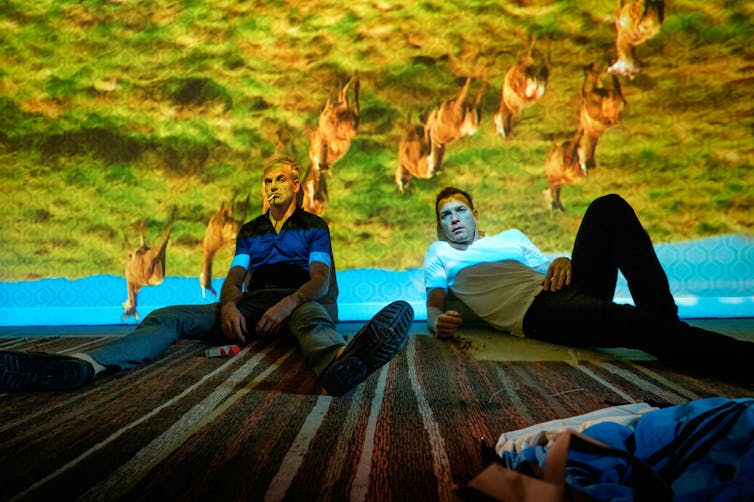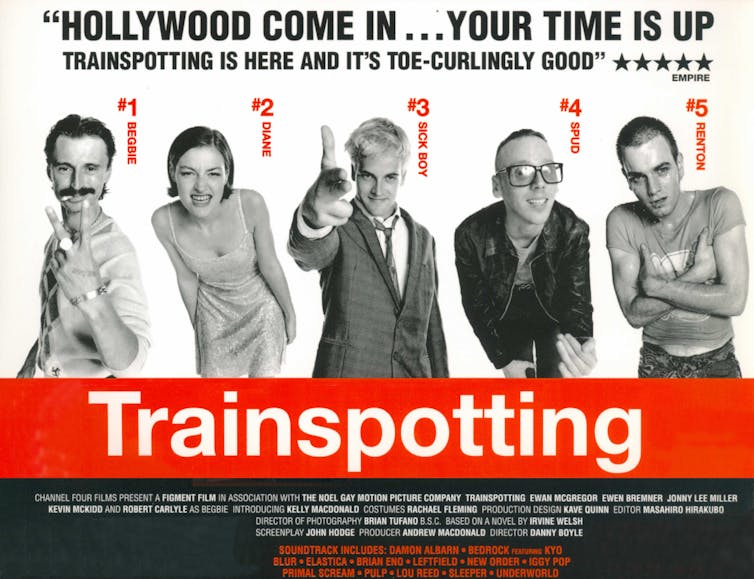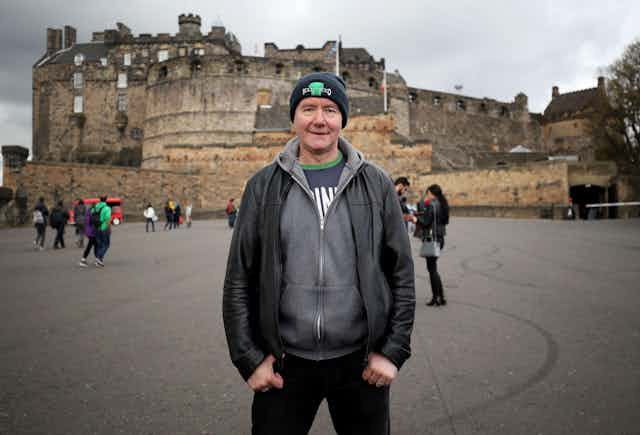On August 23, Scottish novelist Irvine Welsh’s beloved Edinburgh football team, Hibs, went head-to-head with Aston Villa in the Europa League. But they were also competing for attention with the world premiere of Choose Irvine Welsh, a documentary by filmmaker Ian Jefferies about the life, writing and cultural impact of the man it dubs Scotland’s “urban Shakespeare”.
The latter was debuting at the Edinburgh International Film Festival, the former at Easter Road in Leith. As a fellow “Hibby”, on the buildup to the night I found myself wondering: “Which of the tickets would Welsh choose?” I suspect there was little competition. (Hibs were defeated five-nil).
Ian Jefferies’ last documentary – Kick Out the Jams: The Story of XFM (2022) – was a 90-minute dive into 1990s culture via a rebellious pirate radio station. Choose Irvine Welsh is a 90-minute documentary that dives into 1990s culture via a rebellious novelist, exploring and celebrating the cult(ure) surrounding the various films his work inspired.
The two musically augmented, talking-head films are arguably cut from the same cloth. With this in mind, here are some quick strikes against the documentary before getting to what I loved about it.
Choose Irvine’s weaknesses
First, there is an over tendency to use found archival footage to illustrate any proper noun or place name mentioned throughout the 90 minutes. A grating exception being that the film incongruously illustrates discussions of Welsh’s life in dockside Leith with stock images of tartan-clad bagpipers, Edinburgh castle and the Georgian New Town.
Then, there is a predictable, but overwhelming, preference for enthusing testimonials from celebrities such as Danny Boyle, Ewan McGregor, Iggy Pop and Gail Porter, rather than academics or “the real cunts” Welsh knew before he was famous.
The documentary often feels like a formulaic paint-by-numbers job that ubiquitously deploys era music to underscore recorded and archival testimonies. All this gives it the anachronistic feel of a bonus feature for a Trainspotting DVD box-set.

Choose Irvine’s strengths
But not all is lost. Choose Irvine’s strengths make it very worth seeing and appreciating. The film opens with a shot of Princes Street (which is definitely not in Leith, as the documentary suggests) in 1958. This serves double duty. It not only evokes the year of its subject’s birth, but aesthetically anticipates the dynamic opening scene Boyle filmed on this same street in his adaptation of Trainspotting (1996), Welsh’s most famous book.
Unlike that sequence though, this archive footage holds close an image of the iconic Scott monument, a memorial to another great Scottish writer, Sir Walter Scott. Thereafter, Jefferies secures a relaxed and insightful interview with Welsh, which serves as the film’s vertebrae and elevates the whole production.
Welsh’s salty reflections on his near-death experiences, being in various failed “bedroom bands” and his troubled path to becoming a breakthrough author are riveting and illuminating. The story of how his first novel became popular with Scottish prisoners, football types, the “clued-up working class” and then university students also offers a lesson in tipping-point success.
Welsh’s reflections on becoming a breakthrough national novelist in 1993 before catapulting to global success after the release of the Trainspotting film also offer a fresh rat run through the scrapheap of clichés about the “cool Britannia” era, which Welsh describes as a “requiem Mass for British culture”.
Because of Welsh’s well-documented lust for life, the documentary is also laced with funny stories and anecdotes that make the hedonistic 1990s seem incredibly long ago. The story of why Welsh failed to turn up to meet his hero David Bowie is a gas, as is the story of signing a young Martin Compston’s Trainspotting poster with “fuck the Tories and fuck the Jambos” (the nickname for Hibs’ rival football team, Hearts), scrawled across Ewan McGregor’s forehead.

Choose Irvine’s philosphy
Although wild and rough around the edges, the documentary paints the author of extremely dark and disturbing tales as an optimistic soul with a solid moral compass. His friends perceive his novels to be “not just about drugs, shagging, getting pissed and fighting” but about “love between groups of people, or couples”.
In reflexive discussion, Welsh talks perceptively about his observations on group dynamics and manages to get across a grounded practical philosophy for getting on in life. This we might call, with echoes again of his being a lifelong Hibs fan, “choose failure”.
As Welsh puts it himself in response to a question about possible future success: “You want to think to yourself, ‘Nothing is a complete success or failure’. I think if you can do that, in the knowledge that you’ve given your best, then that’s a success really.”
And Choose Irvine Welsh is a success. For anyone interested in the life and times of this much-read Scottish author, the 1990s more generally and the fandom surrounding the adaptations of his work, it’s a must see.

Looking for something good? Cut through the noise with a carefully curated selection of the latest releases, live events and exhibitions, straight to your inbox every fortnight, on Fridays. Sign up here.

